Can Dogs Eat Raccoon Meat Safely?
Feeding raccoon meat to dogs is not recommended due to significant health risks. While raccoon meat is high in protein and essential nutrients, it poses a threat of bacterial contamination such as Salmonella and E.
coli, and carries potential parasites like roundworms and tapeworms. Proper preparation—cooking to an internal temperature of 165°F—is essential but does not eliminate all risks, such as rabies.
Additionally, nutritional imbalances may arise from relying on wild game. Consulting a veterinarian before making any dietary changes is advisable.
For a thorough understanding of the implications and safer alternatives, further details are provided.

Key Takeaways
- Raccoon meat must be thoroughly cooked to 165°F (74°C) to eliminate harmful bacteria and parasites.
- Proper sourcing and preparation are crucial to avoid foodborne illnesses and environmental contaminants.
- Raw raccoon meat can transmit harmful parasites, bacteria, and viruses, posing health risks to dogs.
- Consult a veterinarian before introducing raccoon meat to ensure it meets nutritional needs and is safe.
- Alternatives like commercial dog food and balanced homemade meals are safer options for dogs.
Nutritional Profile
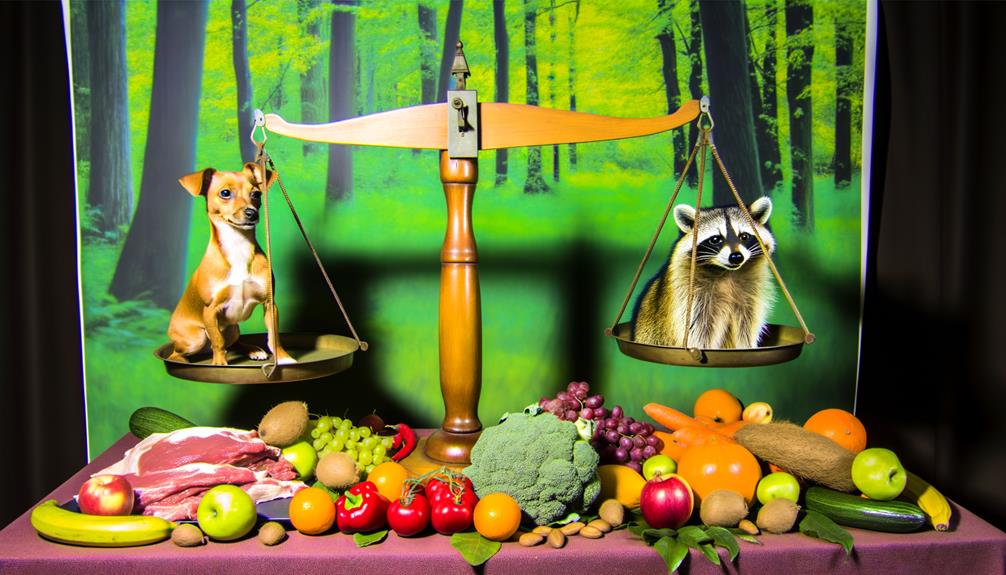
The nutritional profile of raccoon meat is crucial to understand before considering it as a dietary option for dogs.
Raccoon meat is relatively high in protein, a key nutrient for canine health, promoting muscle maintenance and overall well-being. It also contains essential amino acids that are required for various biological processes.
Concerning fat content, raccoon meat provides a moderate amount, which can be advantageous for energy but requires careful portion control.
Vitamins and minerals such as iron, zinc, and B vitamins are present, contributing to metabolic functions and immune support. However, it's noteworthy that the nutritional value can vary based on the raccoon's diet and habitat, requiring thorough consideration and possibly supplementation.
Potential Health Risks
Exploring raccoon meat as a dietary option for dogs requires an examination of potential health risks associated with its consumption. One primary concern is the possibility of harmful bacteria, such as Salmonella and E. coli, which can cause severe gastrointestinal distress in dogs.
Additionally, the presence of toxins or environmental contaminants in raccoon meat poses a risk, particularly if the raccoons have been exposed to polluted habitats.
It is also important to take into account the risk of foodborne illnesses that could be transmitted through improper handling or cooking of the meat. Owners should be vigilant about sourcing and preparing raccoon meat safely to mitigate these health hazards, ensuring it is a viable and safe option for their pets.
Parasites and Diseases
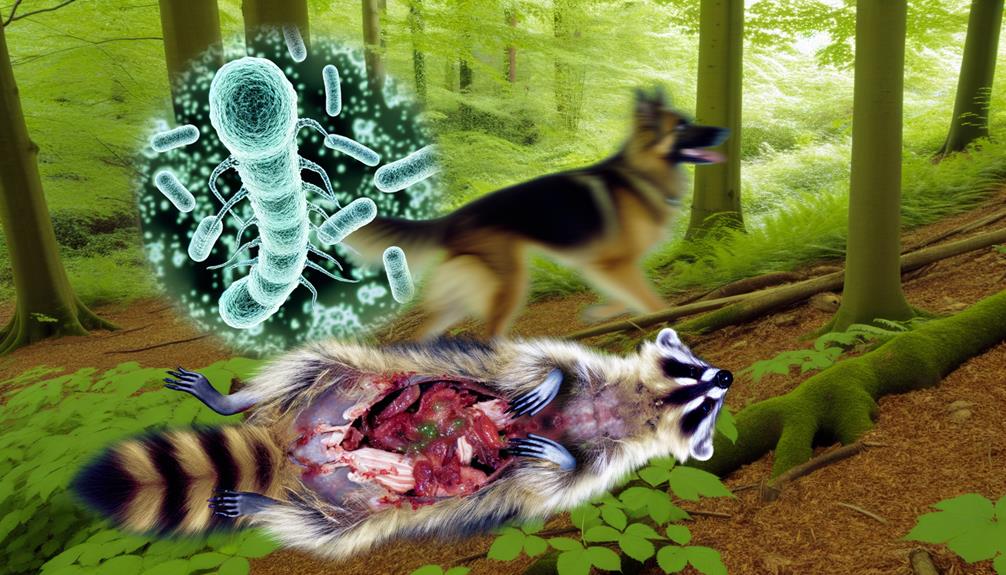
Raccoon meat carries a significant risk of transmitting parasites such as roundworms and tapeworms to dogs.
Moreover, bacterial infections like leptospirosis and salmonellosis pose serious health threats.
Moreover, raccoons are known carriers of viral diseases such as rabies, which can be fatal to dogs if transmitted.
Common Parasites Found
Although raccoon meat may seem like a natural food source for dogs, it often harbors a variety of parasites and pathogens that can pose significant health risks. Common parasites found in raccoon meat include roundworms, tapeworms, and protozoans. These parasites can lead to severe gastrointestinal issues and other systemic illnesses in dogs. Below is a table summarizing some of the common parasites found in raccoon meat and their potential impacts:
| Parasite | Type | Potential Impact on Dogs |
|---|---|---|
| Baylisascaris | Roundworm | Neurological damage |
| Taenia | Tapeworm | Intestinal obstruction |
| Trichinella | Roundworm | Muscle pain, fever |
| Giardia | Protozoan | Diarrhea, gastrointestinal upset |
| Toxoplasma | Protozoan | Neurological symptoms, lethargy |
Understanding these risks is essential for pet owners to make informed decisions about their dog's diet.
Bacterial Infections Risk
The consumption of raccoon meat by dogs presents a substantial risk of bacterial infections, which can lead to severe health complications. Bacteria such as Salmonella and E. coli are commonly found in raccoon meat and can cause gastrointestinal distress, including vomiting and diarrhea.
Furthermore, raccoons may carry Leptospira, the bacteria responsible for leptospirosis, which can be transmitted through contaminated meat. Symptoms of leptospirosis in dogs include fever, muscle pain, and kidney failure.
Additionally, raccoon meat can harbor Yersinia enterocolitica, leading to yersiniosis, a condition characterized by fever and abdominal pain. Proper cooking may reduce these risks, but the potential for cross-contamination and the severity of bacterial infections make feeding dogs raccoon meat highly inadvisable.
Potential Viral Threats
Beyond bacterial infections, the consumption of raccoon meat by dogs also poses significant risks of viral threats and parasitic diseases. Raccoons are known carriers of various pathogens that can severely impact canine health.
Key concerns include:
- Canine Distemper Virus (CDV): Raccoons can harbor CDV, a highly contagious virus that affects dogs' respiratory, gastrointestinal, and central nervous systems.
- Rabies: Raccoons are common rabies vectors, a fatal viral disease transmissible to dogs through infected saliva.
- Baylisascaris procyonis: This raccoon roundworm can cause severe neurological damage in dogs if ingested.
Understanding these risks underscores the importance of avoiding raccoon meat as a dietary option for dogs, thereby protecting them from significant health threats.
Cooking and Preparation
Proper cooking and preparation of raccoon meat are important to guarantee it is safe for canine consumption. To start, thorough cleaning of the meat is necessary to eliminate any parasites or contaminants. Raccoon meat must be cooked to an internal temperature of at least 165°F (74°C) to effectively destroy harmful bacteria and pathogens.
Avoid seasoning the meat with ingredients that may be toxic to dogs, such as onions or garlic. Boiling or slow-cooking methods are preferred as they ensure even heat distribution and reduce the risk of undercooking. Additionally, removing bones is essential to prevent choking hazards or internal injuries.
Following these steps minimizes health risks, making raccoon meat a safer dietary option for dogs.
Expert Veterinary Opinions
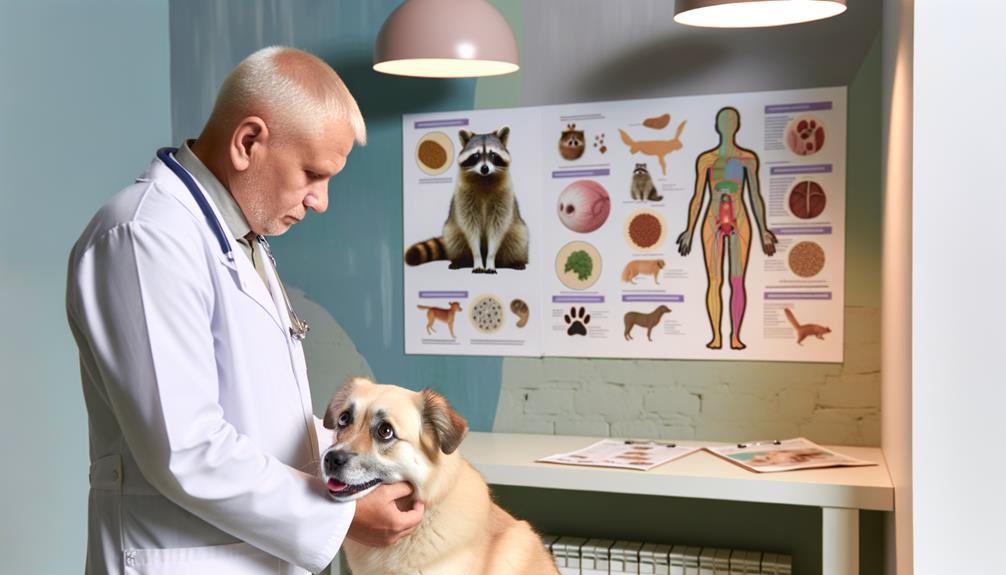
Veterinary experts emphasize that while proper cooking techniques are essential, understanding the broader health implications of feeding dogs raccoon meat is equally significant. Given the potential risks, veterinarians highlight several key considerations:
- Disease Transmission: Raccoon meat can harbor pathogens such as Baylisascaris procyonis (raccoon roundworm) and leptospirosis, which can be harmful to dogs.
- Nutritional Imbalance: Raccoon meat may not offer a balanced array of nutrients required for canine health, potentially leading to deficiencies.
- Digestive Issues: Unfamiliar proteins in raccoon meat may cause gastrointestinal distress, including vomiting and diarrhea.
Understanding these factors is essential for pet owners seeking to guarantee the well-being of their dogs. Consulting a veterinarian before introducing any unconventional meat is strongly recommended.
Alternatives to Raccoon Meat
When considering alternatives to raccoon meat for your dog, commercial dog food options provide a balanced and nutritionally complete diet, formulated to meet canine dietary needs.
Additionally, safe homemade dog meals, crafted under veterinary guidance, can offer a tailored approach to your pet's nutrition.
Both alternatives guarantee that your dog receives essential nutrients without the potential risks associated with consuming wild game.
Commercial Dog Food Options
There are numerous commercial dog food options available that provide balanced nutrition and serve as safer alternatives to raccoon meat. These products are formulated to meet the dietary needs of dogs, ensuring they receive essential nutrients.
When selecting commercial dog food, consider the following:
- Nutritional Completeness: Choose brands that meet AAFCO (Association of American Feed Control Officials) standards, ensuring they contain all necessary vitamins and minerals.
- Quality Ingredients: Select products with high-quality protein sources, such as chicken, beef, or fish, and avoid those with excessive fillers or artificial additives.
- Specialized Formulas: Search for options tailored to your dog's specific needs, such as age, breed, or health conditions, to provide ideal support.
These commercial options offer a reliable, regulated, and safe dietary choice for your pet.
Safe Homemade Dog Meals
While commercial dog foods offer a regulated and convenient option, preparing safe homemade meals can also provide balanced nutrition and serve as a healthy alternative to raccoon meat. Homemade dog meals can be tailored to meet specific dietary needs, ensuring that your canine companion receives ideal nutrients. Key ingredients such as lean meats, vegetables, and grains can be combined to create well-rounded meals. Below is a table to help guide the selection of appropriate ingredients.
| Ingredient Type | Examples |
|---|---|
| Lean Proteins | Chicken, Turkey, Beef |
| Vegetables | Carrots, Peas, Spinach |
| Grains | Brown Rice, Oats, Quinoa |
| Dairy | Cottage Cheese, Plain Yogurt |
| Fats | Fish Oil, Olive Oil |
These ingredients, when properly balanced, contribute to a nutritious, homemade diet for dogs.
Wild Vs. Domestic Diet
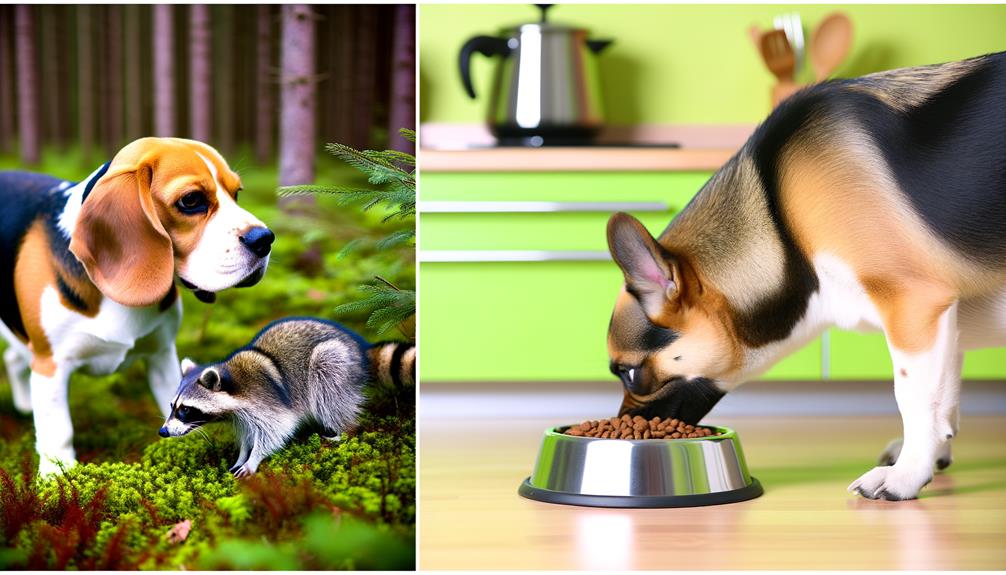
In examining the dietary differences between wild and domestic dogs, it is vital to take into account the nutritional needs and natural behaviors of each.
Wild dogs often consume a diverse diet consisting of small mammals, birds, and carrion, providing varied nutrition. Conversely, domestic dogs typically rely on commercially prepared foods designed to provide balanced nutrients.
Key differences include:
- Protein Sources: Wild dogs eat raw meat, while domestic dogs often consume cooked or processed proteins.
- Nutrient Balance: Domestic dog food is formulated to meet specific dietary requirements, unlike the opportunistic diet of wild dogs.
- Health Risks: Wild dogs develop immunity to certain pathogens, whereas domestic dogs may be more susceptible to foodborne illnesses.
Understanding these distinctions is essential for responsible pet care.
Signs of Food Poisoning
Recognizing the signs of food poisoning in dogs is essential for timely intervention and treatment. Common symptoms may include vomiting, diarrhea, and lethargy. Early detection is critical to prevent complications. Below is a table highlighting key symptoms and their descriptions:
| Symptom | Description | Severity |
|---|---|---|
| Vomiting | Frequent expulsion of stomach contents | Mild to Severe |
| Diarrhea | Loose or liquid bowel movements | Moderate to Severe |
| Lethargy | Unusual tiredness or lack of energy | Mild to Severe |
Other signs might include loss of appetite, abdominal pain, and dehydration. If any of these symptoms are observed, consult a veterinarian immediately. Proper diagnosis and treatment can mitigate adverse effects and support your dog's recovery.
Safe Feeding Practices
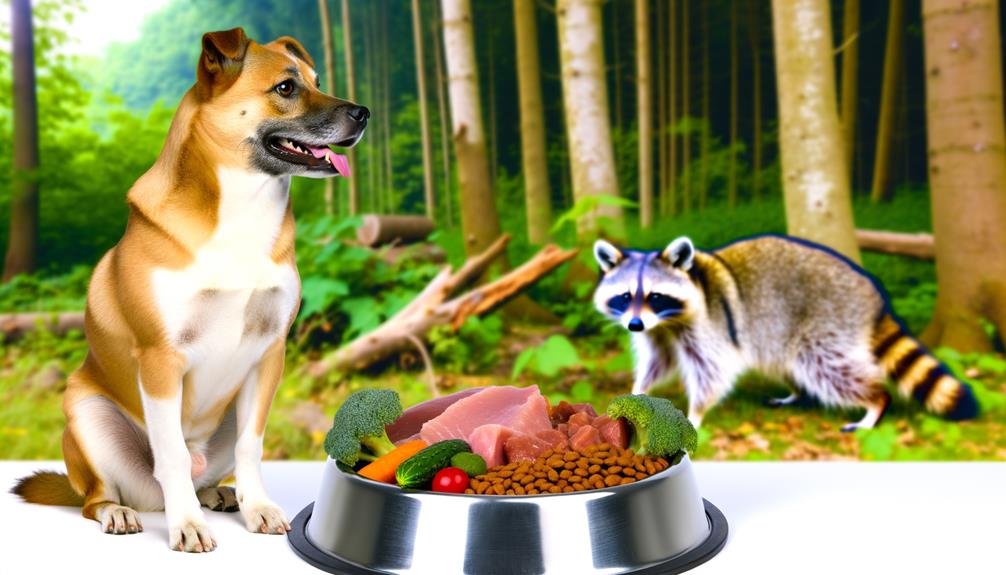
Ensuring that your dog consumes a safe and balanced diet is essential to preventing food-related health issues. While raccoon meat may be an unconventional choice, it is important to follow specific safe feeding practices to mitigate risks.
- Proper Cooking: Thoroughly cook raccoon meat to eliminate harmful pathogens, such as parasites and bacteria, which could cause severe illness.
- Moderation: Introduce raccoon meat gradually and in moderation to monitor your dog's reaction and avoid gastrointestinal distress.
- Consultation: Always consult with a veterinarian before adding raccoon meat to your dog's diet to guarantee it aligns with their nutritional needs and health status.
Adhering to these guidelines will help guarantee that your dog remains healthy while exploring new dietary options.
Conclusion
To sum up, while raccoon meat can offer a nutritional profile suitable for canine consumption, the potential health risks, including parasites and diseases, cast a long shadow over its benefits. Expert veterinary opinions and the complexities of cooking and preparation further underscore caution.
Instead, safer, commercially available alternatives should be considered. Feeding practices must prioritize health and safety to prevent food poisoning, ensuring a dog's diet is as robust and reliable as a well-tuned instrument.






